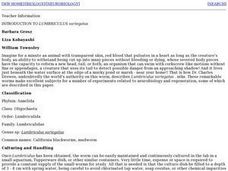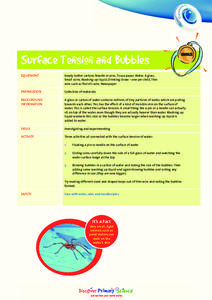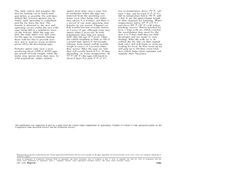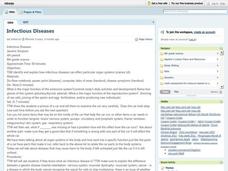Curated OER
Habitats and Adaptations
Students research and describe the habitat and adaptations of a reef animal. After the student is assigned a habitat, they design and draw a cresture adapted to eat each food and to live in each habitat.
Curated OER
Introduction to Lumbriculus variegatus
Students conduct two set experiments on Lumbriculus worms and create a third experiment of their own. The first of the two set experiments allows students to observe regeneration of the worms while the second allows students to test the...
Curated OER
Movement Across the Membrane (Diffusion)
Learners investigate the concept of diffusion and how materials enter and leave a cell. In this movement across a membrane lesson plan, students use perfume, food coloring in water and a sugar cube in water to observe diffusion. They...
Curated OER
Types of Chemical Reactions Lab
In this chemical reactions activity, students experiment with several different reactions and identify each as a single replacement, double replacement, synthesis, decomposition or combustion reaction. Students observe the changes in...
Curated OER
Trout Cookies
Learners explore the external anatomy of a fish. In this anatomy and adaptations lesson, students look at an image of a trout and identify its various external features including fins, eyes, spots, parr marks and lateral line. Learners...
Curated OER
Balloon Fun
Students conduct an experiment with balloons and skewers. They speculate the reasons for the balloon's reactions to the skewers and write about their observations.
Curated OER
The Differences Between Turtles and Tortoises
First graders differentiate between turtles and tortoises. In this turtles and tortoises lesson plan students are visited by a turtle and a tortoise. Students write a letter with an illustration after the animals visit the class.
Curated OER
Yo! Gert-making yogurt
Young scientists or chefs culture yeast to produce yogurt. The materials and a general description of how make yogurt are provided, but there is very little detail otherwise. You could use this as an activity when your biology class is...
Curated OER
Check Out Lights and Shields with Beads
Students explore Ultraviolet detecting beads and conduct several investigations with them. In this investigative lesson students participate in an experiment to see the harmful effects of UV light and discuss their findings.
Curated OER
Surface Tension and Bubbles
Pupils investigate surface tension and bubbles. In this scientific inquiry lesson plan, students explore how the surface tension of water is able to support tiny objects that actually weigh more than the water as they collect date by...
Curated OER
Makeup-- A Wealth of Minerals
Students examine how a variety of minerals are used in make-up. They discuss the minerals that are found in things like make-up, soap, shampoo, and toothpaste and determine where the minerals come from.
Curated OER
Use of Microscopes and Creation of Slides
Students explore the use of microscopes and the creation of slides. They practice using, adjusting and viewing with a microscope. they view slides of familiar substances such as blood and fibers. In addition, they create slides using...
Curated OER
Making a Miniature Concrete Girder
In this concrete girder worksheet, students use water, sand, cement and gravel to construct concrete girders. Students vary the proportions of the mixtures and label each concrete girder with the mixture's components.
Curated OER
The Synthesis of Some Organic Compounds And Their Representative Structures
Students examine how to represent organic compounds three-dimensionally. They write a synthesis reaction for three demonstrations, and construct a three-dimensional structure using a molecular modeling set.
Curated OER
Birds
In this biology activity, students complete a crossword puzzle with 34 questions on bird classification and characteristics.
Curated OER
Hand Sensitivity
Students experiment with the sense of touch. In this tactile lesson plan, students determine the most sensitive area of the hand. Students experiment by describing objects through touch only. Students compare the amount of sensory data...
Curated OER
All About Me: My Senses
Pupils explore the world around them and identify their five senses and the parts of their bodies that are associated with each sense.
Curated OER
How Do Cells Reproduce?
Learners discuss the importance of reproduction of cells. They identify and describe the stages of Mitosis. They discover what happens to chromosomes and DNA during reproduction.
Curated OER
Channel Catfish
Students study the life and biology of the Channel Catfish. In this aquatic biology instructional activity, students will examine the external and internal features of the catfish along with their breeding habits and environment. This...
Curated OER
Infectious Diseases
Eighth graders identify and explain how infectious diseases effect organ systems. Using an analogy with automobiles and body systems, they discover how one part influences the operation of the whole. Students write paragraphs about...
Curated OER
How to tell when mealworms are out of breath
Students explore the respiration rate of a mealworm. Through experimental means, they determine the average volume of oxygen used and discuss factors that affect the respiration rate of an organism.
Curated OER
Earth: The Apple of our Eye
Pupils are led through a demonstration in which they cut open an apple, which represents the earth. They follow through the hands-on lesson, cutting the apple into various portions--each representing some aspect of the earth.
Curated OER
Activity #19 Oxygen For Yeast
Pupils observe and record what occurs when yeast is added to hydrogen peroxide. They indicate why a chemical reaction (decompostion) must have occurred during the experiement. Pupils explain why yeast was used. Students comprehend the...
Curated OER
Soil Demonstration Follow Sheet
For this soil worksheet, learners answer questions as their teacher performs a demonstration by cutting apples into equal parts. Students identify what each section represents until the teacher is down to 1/32 of the apple.























